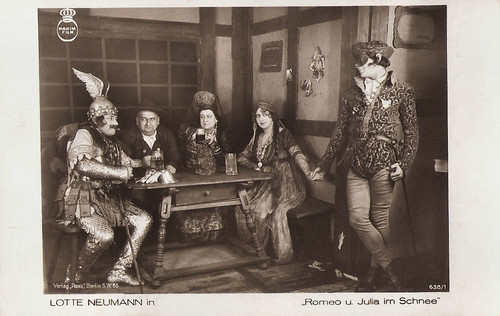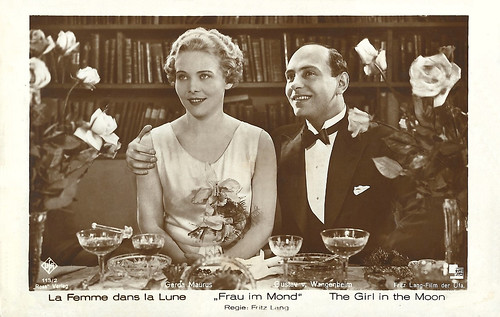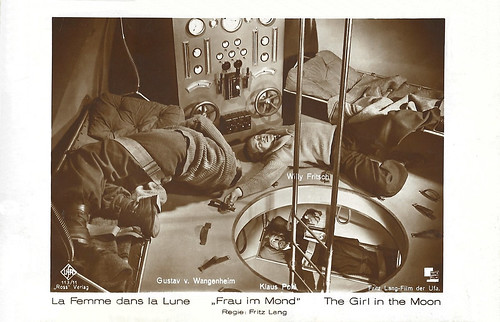
German postcard by Photochemie, Berlin, no. K. 1879. Photo: Alex Binder.

German postcard by Ross Verlag no. 630/2. Photo: Messter Film, Berlin. Henny Porten and Gustav von Wangenheim in Kohlhiesels Töchter/Kohlhiesel's Daughters (Ernst Lubitsch, 1920).

German postcard by Ross Verlag, no. 636/1. Photo: Maxim Film. Jakob Tiedtke (Herr Capulethofer), Marga Köhler (his wife), Lotte Neumann (their daughter Julia) and Gustav von Wangenheim (Romeo Montekugerl) in the comedy Romeo und Julia im Schnee/Romeo and Juliet in the Snow (Ernst Lubitsch, 1920). The man on the left dressed as an antique hero could be Julius Falkenstein as Paris.

German postcard by Ross Verlag, Berlin, no. 113/16. Photo: Fritz Lang-Film der UFA. Photo: Ufa. Willy Fritsch and Gustav von Wangenheim in Frau im Mond/Girl in the Moon (Fritz Lang, 1929).
His most enduring role
Gustav von Wangenheim was born Ingo Clemens Gustav Adolf Freiherr von Wangenheim in Wiesbaden, Hesse, in 1895. His parents were Eduard Clemens Freiherr von Wangenheim and the Jewish actress Minna Mengers. Both of his parents were performers. His father, who used the stage name Eduard von Winterstein, appeared in over 200 films between 1910 and 1960. After his mother committed suicide when Gustav von Wangenheim was only four years old, his father married the actress Hedwig Pauly, who was also Jewish.
Gustav attended Max Reinhardt's drama school in 1912. This was followed by stage engagements in Vienna, Darmstadt and Berlin. He briefly served in the Imperial German Army during World War I but was discharged in 1915 because of an eye injury. Von Wangenheim made his screen debut in Passionels Tagebuch/Passionel's Diary (Louis Ralph, 1914) and appeared in the silent Science Fiction serial Homunculus (Otto Rippert, 1916) written by Robert Reinert. Fritz Lang was one of Rippert's assistants during filming. Von Wangenheim co-starred in Ernst Lubitsch's classic silent comedies Kohlhiesels Töchter/Kohlhiesel's Daughters (Ernst Lubitsch, 1920) starring Henny Porten and Emil Jannings, and the William Shakespeare variation Romeo und Julia im Schnee/Romeo and Juliet in the Snow (Ernst Lubitsch, 1920) with Lotte Neumann.
In 1921, Von Wangenheim was cast in F. W. Murnau's expressionist vampire film Nosferatu/Nosferatu: A Symphony of Horror as Thomas Hutter which would prove to be his most enduring role. Max Schreck starred as Count Orlok, a vampire who preys on the wife (Greta Schröder) of his estate agent Thomas Hutter and brings the plague to their town. Nosferatu was an unauthorised and unofficial adaptation of the 1897 novel 'Dracula'. Hutter was based on the character of Jonathan Harker in 'Dracula'. Various other names and details were changed. Count Dracula was renamed Count Orlok then finally Nosferatu, an archaic Romanian word with a suggested etymology of Nesuferitu`, meaning "the offensive one" or "the insufferable one".
Among Gustav von Wangenheim's other silent filmnworks were the Science Fiction films Das Haus zum Mond/The House on the Moon (Karl Heinz Martin, 1921) starring Leontine Kühnberg, the expressionist film Schatten – Eine nächtliche Halluzination/Warning Shadows (Arthur Robison, 1923) starring Fritz Kortner and Ruth Weyher and Fritz Lang's Frau im Mond/Girl in the Moon (Fritz Lang, 1929) starring Willy Fritsch and Gerda Maurus.
In 1917, Von Wangenheim wrote a play about the October Revolution, 'Der Mann Fjodor', for which he received a prize from 'the magazine 'Junges Deutschland' (Young Germany). Paul Cassirer became his publisher. He came into contact with cultural politicians from the USPD (Independent Social Democratic Party of Germany) and in November 1918 he joined the Reichstag and the 'Council of Intellectual Workers'. Since 1922, he was a member of the Communist Party of Germany (the KPD). Gustav von Wangenheim married fellow communist Inge Franke in 1931. They founded the Communist theatre company Die Truppe '31. Die Truppe '31 produced three plays, authored and directed by Von Wangenheim before it was shut down by order of the Nazi regime in 1933.

German postcard. Ross Verlag, no. 638/2. Photo: Maxim Film. Publicity still for Romeo und Julia im Schnee/Romeo and Juliet in the Snow (Ernst Lubitsch, 1920), with Lotte Neumann (Julia Capulethofer) and Gustav von Wangenheim (Romeo Montekugerl). Behind them, Jakob Tiedtke and Marga Köhler as Julia's parents.

German postcard by Ross Verlag, no. 638/3. Photo: Maxim Film. Lotte Neumann (Julia) and Gustav von Wangenheim (Romeo Montekugerl) in Romeo und Julia im Schnee/Romeo and Juliet in the Snow (Ernst Lubitsch, 1920).

German postcard by Ross Verlag, no. 636/4. Photo: Maxim Film. Lotte Neumann (Julia) and Gustav von Wangenheim (Romeo Montekugerl) in Romeo und Julia im Schnee/Romeo and Juliet in the Snow (Ernst Lubitsch, 1920).
Arrested in the Soviet Union
Gustav von Wangenheim and his wife Inge fled Nazi Germany in 1933. They first moved to Paris, but then found refuge in the Soviet Union. While living in exile at Moscow's Hotel Lux, he continued writing and producing films, such as Der Kampfer/The Fighter (Gustav von Wangenheim, 1936), about the Reichstag fire trial and communist leader Georgi Dimitroff. The film was banned by Stalin shortly after its completion, and countless contributors were arrested and shot. Von Wangenheim was also the head of the German language Cabaret Kolonne Links.
In 1936, during the Stalinist purges, Gustav von Wangenheim denounced his colleagues Carola Neher and her husband Anatol Becker as Trotskyites. Becker was executed and Neher died in the Gulag system after five years in prison. Gustav von Wangenheim's son later stated the accusations that his father denounced Neher and Becker were one-sided and inaccurate. His son claimed his father, after being arrested by the NKVD and a lengthy interrogation, signed a statement that implicated Carola Neher as being 'anti-soviet' but had in fact explicitly refuted the accusation that Neher and Anatol Becker had planned to murder Stalin. After the National Socialists sentenced Von Wangenheim to death in absentia, he finally accepted Soviet citizenship in 1940. When the war broke out, he began working for the 7th Political Department of the Red Army.
After World War II, Von Wangenheim returned to East Germany. For a few months from September 1945, he was director of the Deutsches Theater Berlin, which he reopened. His first productions, such as 'Nathan der Weise' (Nathan the Wise), 'Hamlet' and 'Gerichtstag' (Judgement Day), were celebrated by the Berlin public. Von Wangenheim had resumed the great tradition of Max Reinhardt. At the same time, the members of the ensemble and the theatre director fought for the release of Gustaf Gründgens from the internment camp in Jamlitz. Gründgens was accused of having cooperated with the National Socialists. Von Wangenheim, but also Ernst Busch and other artists, campaigned for Gründgens' political rehabilitation. Gründgens returned to Berlin on 9 March 1946 and became an actor at the Deutsches Theater again.
On 29 May 1946, a Soviet play was performed for the first time at the Deutsches Theater, 'Stürmischer Lebensabend' by Leonid Rachmanow. It was a defeat for the Soviet military administration and Gustav von Wangenheim was relieved of his duties as theatre director. Throughout his life, he never understood why he was dismissed. While von Wangenheim's appearances in films became rare in the post-war years, he continued to work as a director and screenwriter for DEFA. His films included Und wieder 48/48 All Over Again! (Gustav von Wangenheim, 1948) with a role for his father, Eduard von Winterstein, and Gefährliche Fracht/Dangerous Cargo (Gustav von Wangenheim, 1954).
Gustav von Wangenheim was awarded the National Prize of the GDR for his artistic work, especially for his play 'Du bist der Richtige' (You Are the Right One), which he wrote for the opening of the newly founded Theatre of Friendship. He was married to Inge von Wangenheim from 1931 to 1954. The couple had two sons, Friedel and Edi, and twin daughters, Elisabeth and Eleonora von Wangenheim. Von Wangenheim died in East Berlin in 1975 and was buried in the Friedrichsfelde cemetery in Berlin. He was 80.

German postcard by Ross Verlag, Berlin, no. 113/2. Photo: Fritz Lang-Film der Ufa. Gerda Maurus and Gustav von Wangenheim in Frau im Mond/Girl in the Moon (Fritz Lang, 1929).

German postcard by Ross Verlag, no. 113/9. Photo: Ufa. Gerda Maurus and Gustav von Wangenheim in Frau im Mond/Girl in the Moon (Fritz Lang, 1929).

German postcard. Ross Verlag, Berlin, no. 113/11. Photo: Fritz Lang-Film der Ufa. Willy Fritsch, Klaus Pohl, and Gustav von Wangenheim in Frau im Mond/Girl in the Moon (Fritz Lang, 1929).
Sources: Dimos I (IMDb), Lea S. (Silent-ology), Wikipedia (German and English) and IMDb.
No comments:
Post a Comment